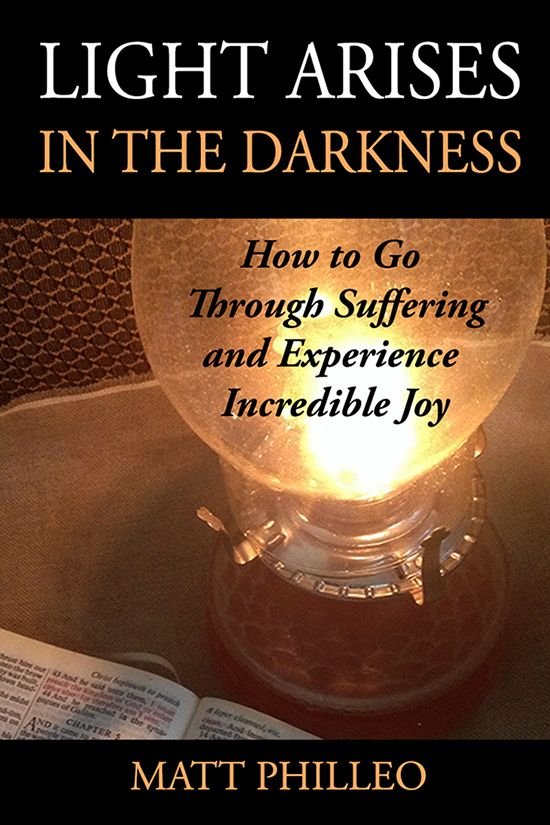Acknowledging your suffering is the first step to being healed of the pain. It’s amazing, though, how often we want to skip this step. That’s what I’m going to talk about in today’s post…
In my last post, I shared with you the last part of the first chapter for my book I’m currently writing, Light Arises in the Darkness: How to Go Through Suffering and Experience Incredible Joy.
Again, I plan on making this a full-length printed book with illustrations, and I want to share it here with you first.

“Faith to Rise” 16 x 20, acrylic on canvas by Matt Philleo
In the previous post, we discussed “What is the Purpose of Suffering?”Today, I’m going to talk about why it is so important to acknowledge your suffering, and how that can pave the way for you to “stop the bleeding” and experience a true sense of peace and joy. I’m not talking about a cliche phrase on a greeting card. I’m talking about something real and something deep.
Something lasting. Even if this kind of peace and joy dissipates, you’ll have a well that you can always run to and refill.

I invite you to become a part of my Reader’s Review Group and I’ll let you know whenever I have a new section on the book written. Also, you will receive a discount on the actual book when it’s published. Click here and Join today!
Light Arises in the Darkness
How to Go Through Suffering and Experience Incredible Joy
Copyright 2017 by Matt Philleo. All rights reserved.
(To help you navigate through the book. I’ll be including links below to various posts…)
CONTENTS
- Why is there Suffering
Part 1
Part 2 - Acknowledging Your Suffering
- Suffering Caused by Financial Problems
- Suffering Caused by Health Problems
- Suffering Caused by Loss Problems
- Suffering Caused by Relationship Problems
- Suffering Caused by Internal Problems
- Seeking the Lord in Your Suffering
- Responding to His Presence and Encouragement
- Becoming an Encourager
“”The disappointment has come – not because God desires to hurt you or make you miserable or to demoralize you or ruin your life or keep you from ever knowing happiness. He wants you to be perfect and complete in every aspect, lacking nothing. It’s not the easy times that make you more like Jesus, but the hard times.”- Kay Arthur

“How are you doing, brother?”
“Great. God bless you, good to see you!”
For churchgoers this is often the usual Sunday morning dialogue. Around the water cooler at work, the dialogue is similar, minus the religious expressions. However, at church, it’s actually worse, because we know we are supposed to be joyful, and so we become masters at faking it.
We erect a wall of solidarity around us when inside we are falling apart. Somehow, we are afraid of being vulnerable with others. We think nobody wants to hear our “sob story,” so instead we pretend things aren’t that bad. Or if we are struggling with a secret sin, a hidden addiction, we don’t want others to know how much we’re struggling. We don’t want ourselves to know how much we’re struggling!

So, on goes the mask, and the charade continues.
Now I am not saying that we should complain and gripe about every little thing. You and I both know people like that. They’re no fun to be around. But when we are going through real suffering, we should be able to open up to those who know us the best and should judge us the least.
The inner dialogue is where it all starts. It’s like this: things in your life start to unravel. Like a loose thread hanging off your clothes, you pull on it, thinking you can handle it. It’s no big deal. It grows longer. You’ve made it worse. But in your haste you try harder, and soon you tear a hole in your clothes, when all you needed to do was stop, recognize there’s a problem, and get the right tool (in this case, a scissors) and accurately cut it off.
Burying your head in the sand, pretending the suffering isn’t there or, on the hand, believing it’s something you can handle, only makes things worse.
When you’re going through suffering, meditate in it, don’t medicate it.
A friend of mine, an old classmate from high school, who has went through intense trials in her life–dealing with miscarriages and severe illness in her family–says this:
“I have nothing. The world says that you have strength in you, to pull out that strength, there is a hero in us. It is not true. That just causes depression, because we can’t muster up this strength that doesn’t exist. We have nothing inside of us that will fill the emptiness or have the power to change us. Not until we ask Jesus in.
“That’s why so many are hurting and feel like they fail. Even people with money and power, and ones that have met great goals and exceeded others’ expectations, have ended their life. The only strength we have is in HIM. And when we remain In HIM and he IN US we can do anything. There is nothing that is impossible. So it becomes a place where I lay myself down and say Lord, fill me up!”
Well said.
In recognizing the suffering for what it is, there is also the ability to discover the root cause of the suffering. It may be sinful behavior in us. It may be an external problem that we can find the wisdom to deal with by seeking God.

But again, we have to recognize we have a problem. Any honest doctor wouldn’t think of writing a prescription without first making an accurate diagnosis. Likewise, the patient wouldn’t think of running to to the hospital unless she realized her health was in jeopardy. Ignoring the symptoms of her disorder could prove fatal.
What if a doctor prescribed a blood-thinning medication to a hemophiliac, who was complaining of chest pains, but really was just suffering from heartburn?
In this case, neither the patient nor the doctor ignored the symptoms, but they failed to accurately diagnose them and to take into account the real source of discomfort. If this person had a severe cut, the incorrect prescription could cause him his life. Many today are going through severe trials and are trying to find relief in a myriad of places–psychoanalytical counseling sessions, drugs, substance abuse, self-improvement seminars, etc. They are not getting to the root of the problem.

When you’re going through suffering, meditate in it, don’t medicate it.
Don’t try to dull the pain by focusing on other things that are more pleasant, filling your life with busyness, or going to other sources to find relief. The pain has a purpose. If you didn’t have a toothache, you wouldn’t go to the dentist. You could dull the paint down with some morphine, but you would end up losing your tooth.
So, the pain is meant to take you somewhere.

That’s it for today. Thanks for reading! In the next post, we’ll continue in this chapter and discuss the idea of “Where will you go?” when you acknowledge your suffering and you’re looking for a cure.
Be blessed and I’ll be in touch,

Share Your Thoughts!

You have pulled out the editor in me. Next to last paragraph, final sentence has a typo. You have “paint” instead of “pain. Otherwise great! This chapter is all I have read so far. Might revisit tomorrow. Wondering if you might want to include scripture in parts of this. What comes to mind for me on this topic is 1 Peter 5:6. Along with notes in the margin from a sermon by Adrian Rogers…abide in Christ, submit to His will over mine, let God be in control. Because more pain comes from fighting what you cannot change than letting go and letting God handle….everything.
Sorry to rattle on. Great job.